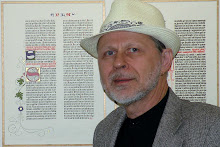01 January 2009
I'm catching up on entering notes that I've been writing in a paper *gasp* journal. I'm backdating to when I wrote the notes.
So - Gutenberg printed the Bible in Mainz Germany about 1455. It was a long process. He invented movable type, which isn't to say that others hadn't also invented it. But most remarkable about the invention was a dimensionally stable alloy. He combined lead, tin, and antimony. Lead and tin both contract when they cool from liquid molten metal to the solid state. Antimony is one of those rare elements that expands as it cools. Gutenberg figured out the ratios that would make the expansion of the antimony counteract the contraction of thelead and tin. I'd like to know those proportions. Gutenberg used lead because it was cheap & molded easily. But it was too soft to withstand the pressure of the press. So he added tin to harden the alloy.
I wonder what the weights of the metals are. Is there a correlation between what this alloy weighs and what gold weighs? I think that gutenberg was working the mathematics, not just experimenting with the physical elements. That would mean that the formula could have taken the form of an algebraic equation.
Oh yes, the formula. Gutenberg was an alchemist. The mixture of lead, tin, and antimony was common among the alchemists attempting to turn lead into gold, or base metal into rare metal. He had set himself up to teach two young men the art of metal working in Strasbourg some years earlier. The brother of one sued him according to court records for not letting him inherit his brother's share.
When he was in the process of printing The bible in Mainz, Gutenberg borrowed heavily from one Johan Fust. Fust sued Gutenberg just before The Bible was finished because Gutenberg had skimmed off some of the loaned money for a private operation. Fust wanted a piece of that action as well. When Gutenberg refused to share the second operation with Fust, the courts awarded the entire Bible printing operation to fust. Peter Schoeffer was awarded the Bible contract and was elevated to master printer from Gutenberg's journeyman. By all the evidence of the works that came from the Schoeffer/Fust operation, Schoefer was probably a better printer than Gutenberg anyway. But what we don't know is exactly what gutenberg was doing in the second shop, even though there were reportedly some other books that were produced.
So - Gutenberg printed the Bible in Mainz Germany about 1455. It was a long process. He invented movable type, which isn't to say that others hadn't also invented it. But most remarkable about the invention was a dimensionally stable alloy. He combined lead, tin, and antimony. Lead and tin both contract when they cool from liquid molten metal to the solid state. Antimony is one of those rare elements that expands as it cools. Gutenberg figured out the ratios that would make the expansion of the antimony counteract the contraction of thelead and tin. I'd like to know those proportions. Gutenberg used lead because it was cheap & molded easily. But it was too soft to withstand the pressure of the press. So he added tin to harden the alloy.
I wonder what the weights of the metals are. Is there a correlation between what this alloy weighs and what gold weighs? I think that gutenberg was working the mathematics, not just experimenting with the physical elements. That would mean that the formula could have taken the form of an algebraic equation.
Oh yes, the formula. Gutenberg was an alchemist. The mixture of lead, tin, and antimony was common among the alchemists attempting to turn lead into gold, or base metal into rare metal. He had set himself up to teach two young men the art of metal working in Strasbourg some years earlier. The brother of one sued him according to court records for not letting him inherit his brother's share.
When he was in the process of printing The bible in Mainz, Gutenberg borrowed heavily from one Johan Fust. Fust sued Gutenberg just before The Bible was finished because Gutenberg had skimmed off some of the loaned money for a private operation. Fust wanted a piece of that action as well. When Gutenberg refused to share the second operation with Fust, the courts awarded the entire Bible printing operation to fust. Peter Schoeffer was awarded the Bible contract and was elevated to master printer from Gutenberg's journeyman. By all the evidence of the works that came from the Schoeffer/Fust operation, Schoefer was probably a better printer than Gutenberg anyway. But what we don't know is exactly what gutenberg was doing in the second shop, even though there were reportedly some other books that were produced.
Subscribe to:
Post Comments (Atom)

0 comments:
Post a Comment